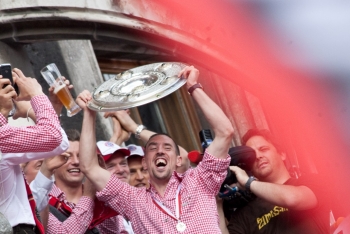For several years, celebrate sports victories with alcohol has become something normal. Players engaged in tournaments, in national and international competitions of all kinds are turning always more often to alcohol.
Just two examples reflect clearly this situation: the Cup won by German Bayern München and the celebration of the Spanish “Liga” won by FC Barcelona. Where did we leave the image of sport as a model for life?
Unpleasant was also the celebration of the European Football Championship in Spain last summer. At that time, Ignacio Calderón, in charge of the public campaign against drugs in Spain, has been particularly critical of the general attitude of the players in the celebrations: "I find this sad and reckless" and, referring to the same players he affirmed: "The celebration makes me upset and dislike it at all. I find it disturbing that no one said this to the players".
On the other hand, we also have examples of fighting this widespread use and abuse of alcohol: the Belgian Olympic Committee during the 2012 Olympic Games in London, expelled the cyclist Gijs van Hoecke, who was going to participate in the "Omnium" and "Team Pursuit" , due to some photos in which appeared completely drunk.
Another case is the Russian delegation, after the Winter Olympic Games in Vancouver in 2010, decided to forbid athletes and the entire Russian official delegation the consumption of alcohol during the London Olympics. "The Olympic values are not compatible with alcohol," said the Russian spokesman.
The abuse of alcohol is a drama, a very serious problem and difficult to eradicate. It not only affects oneself physically and psychologically, but also has an impact on those around him. Those who practice sport on a professional level should consider the maxim "sport is health." Their responsibility goes beyond respecting themselves. Athletes are people who are admired and many of them are role models for adolescents who are living a period of instability, to whom every gesture and action can be taken as a guideline to be followed. Given the influence the athletes have, should they not transmit a teaching on the proper place that alcohol must have?
According to the World Health Organization, the harmful use of alcohol results in 2.5 million deaths each year, and approximately 320,000 young people between 15 and 29 years die each year from causes related to alcohol, a 9 % of deaths in this group of age.
This is not to demonize any alcoholic beverage. We all know, for example, that two glasses of wine per day for men and one for women, have important benefits for cardio health. But, unfortunately, there are few cases where the recommendations are overlooked and it’s here that the potential benefits of these drinks becomes a negative factor that affects your health and those activities that offer great benefits to the body.
In short, the athlete (especially the popular one) should realize the enormous influence and impact that his/her actions, words and attitude have in an always increasing globalized world.


